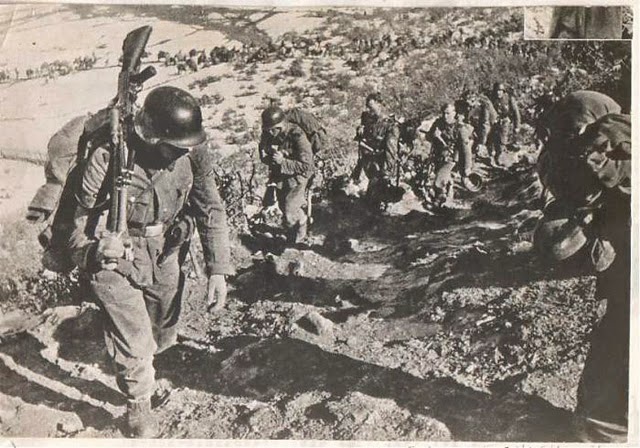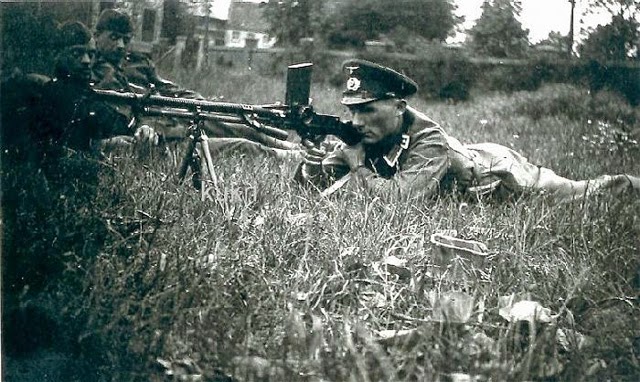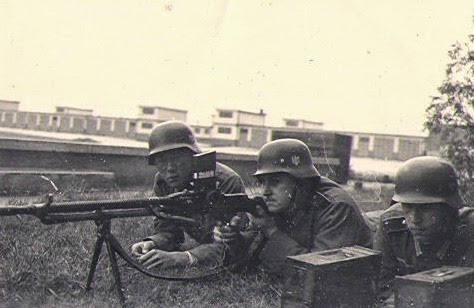The ZB-26 light machine gun was developed in Czechoslovakia in the 1920s and used by the Czech military and also exported to other countries. Further development of the ZB-26 resulted in later versions including the ZB-30. A major customer of this latter model was Yugoslavia with 15,500 weapons bought. Romania (a later ally of Germany on the eastern front) also bought 17,131 of these ZB-30 machine guns. When Germany occupied Czechoslovakia in March 1939, the ZB-26 and ZB-30 were both incorporated into the Wehrmacht and Waffen-SS under the designations MG26(t) and MG30(t), the suffix (t) denominating a captured weapon of Czech (“tschechisch”) origin. Altogether, the Germans acquired 31,204 ZB-26 and ZB-30 machine guns at that time, some sources indicate that the majority of the captured guns were the ZB-30 model. 1,500 of these guns were sold to the German ally Bulgaria, the others were issued to the various Wehrmacht branches and also the Polizei and Waffen-SS. Later, when Germany occupied Yugoslavia, they also captured some of the 15,500 ZB-30 machine guns that had been sent there, although it is unknown how many of these exactly were captured. Production of these weapons was continued under German occupation in Czechoslovakia and 10,430 were produced for the Wehrmacht and SS in 1939 and 1940. These examples cannot technically be considered “captured” but were actual German production. In 1941 production was switched over to the MG 34 and production of the MG30(t) / ZB-30 ceased.
The Wehrmacht command issued a manual for these weapons.
Some photographs of these weapons in use with the German Heer.
We have researched what kinds of units this weapon was issued to and have found some evidence in the form of original Wehrpässe for soldiers who were trained on these guns. Here are some scans from a Wehrpass of a soldier who served in Landesschützen and construction units. At one time his job was guarding POW camps. He was trained on the MG26(t).
Other documents from other sources show the Czech light machine guns issued to soldiers in similar units. A Wehrpass for a soldier who was part of the occupation forces in the Netherlands, performing security duties as part of Sicherungs-Regiment 26, was trained on the “le. M.G. (t),” this could have been either a 26 or a 30. Further evidence for the use of these weapons in Sicherung units was found in a Wehrpass issued to a soldier who served in Landesschützen-Bataillon 638 (part of Sicherungs-Regiment 285) who took part in the campaign in Russia from August 1941 until February 1942 when he was grievously wounded. Other rear-line and garrison type units also used this weapon in occupied areas. A Wehrpass to a soldier assigned duty securing the coast of the Atlantic and English Channel in France shows training on Czech weapons including the MG26(t) (listed as l. M.G. 26 (Bruenn), for the place where it was made), a Czech pistol and a Czech Pak cannon. German records for the island of Jersey in the English Channel show 4 x MG26(t) as part of the ‘pool’ of weapons for the 319. Inf. Div. stationed there. There were also 500 x MG34 and 200 x MG42 plus 200 other mixed MG types of mainly French origin.
The use of Czech and other captured, obsolete and reissued weapons in rear-line units was widespread. The following weapons were recorded in use by Sicherungs-Brigade 203 on the Eastern Front as of June 1, 1942:
German K98k rifles: 3.123
Polish, Czech, Yugoslavian rifles: 2.650
French and Dutch rifles: 811
Russian rifles: 1.110
Pistols: 929
Submachine guns (MP 38): 43
MG 08/15: 137
MG 34: 6
MG26(t) and MG30(t): 178
Russian machine guns: 73
MG08 heavy machine guns: 5
Russian heavy machine guns: 85
Russian light mortars: 87
Russian heavy mortars: 28
Anti-tank rifles: 4
Russian anti-tank cannons: 8
Note that in this particular Sicherung unit, Czech machine guns greatly outnumbered the German MG34. Original Soldbücher that we have examined show that captured weapons like those in the above list were still being issued on a wide scale to rear-area support troops until the end of the war.
Sicherungs-Regiment has a ZB30 that we use to represent the MG30(t) in our displays and living history vignettes. It’s an original weapon that has been demilitarized and deactivated. Since we are a rear-area unit, many of the scenarios we create do not involve firing weapons, so this dummy gun works just fine. The captured and obsolete weapons we use enhance our impression of Sicherung troops.






